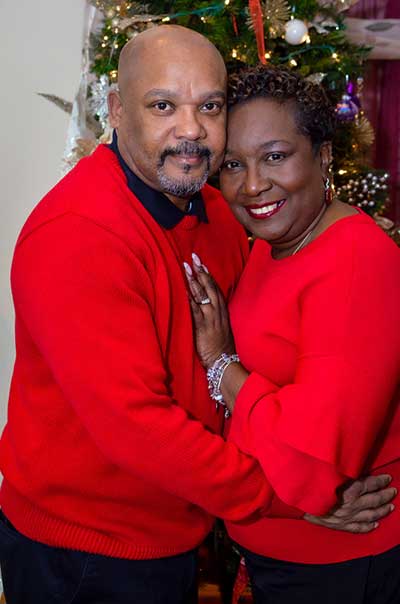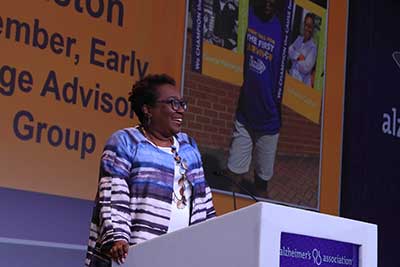
Double Your Impact for the Holidays
Double Your Impact for the Holidays
Your urgently needed year-end gift can go twice as far to provide care and support and accelerate Alzheimer's research this holiday season — and all year long. Show your giving spirit today during this 2x Match Challenge.
Donate NowArthena Caston’s huge personality and earnest interest in everyone she meets has made her an ideal person to share her experience with dementia. “I am always talking and I am always listening.” As a member of the Alzheimer’s Association National Early-Stage Advisory Group, Arthena is speaking out to break the stigma of Alzheimer’s for those who can’t.
 At first, Arthena began noticing lapses in her memory at work. At home, some of her favorite pastimes — cooking, reading and trips to her favorite crafting store — were becoming more challenging. Then came the day she left her car running for an entire day in her work parking lot. After that day, Arthena, her husband or her children couldn’t deny that something was going on.
At first, Arthena began noticing lapses in her memory at work. At home, some of her favorite pastimes — cooking, reading and trips to her favorite crafting store — were becoming more challenging. Then came the day she left her car running for an entire day in her work parking lot. After that day, Arthena, her husband or her children couldn’t deny that something was going on.
Arthena and husband Virous shared their concerns with her primary care physician, and after visiting a neuropsychiatrist and seeing a neurologist, Arthena received her diagnosis of mild cognitive impairment (MCI) at age 51. Arthena wasn’t going to take her diagnosis lying down. “I had watched the progression of Alzheimer’s disease in my father, a strong military man who became a shell of his former self. I didn’t want that to be my fate. Once I had my diagnosis, I knew I had to take action for myself and my family.” Arthena called the Alzheimer’s Association 24/7 Helpline, and she was immediately connected with her local chapter.
Taking Action After a Diagnosis
Married for 28 years, Arthena’s greatest supporter is her husband, Virous. “He is my rock and more proud of me than anyone I know,” she says. “He encourages me to be me.”
While Arthena’s diagnosis has changed their lives, communicating openly has made the transition easier. “There is nothing to truly prepare you for going from two incomes to one, to lose the opportunity to be empty nesters, retiring together, all those things we were supposed to be enjoying,” Virous says. “But now I have to think about what happens if she isn’t here one day.”
Together, Arthena and Virious are planning for their future, whatever that may be. “We faced the emotions of Arthena’s diagnosis, but we also addressed the legal and financial implications of her disease. We are using the resources and support the Alzheimer’s Association has to offer, and Arthena is spreading awareness of these resources every day.”
Facing Stigma
Today, at age 54, Arthena has a renewed sense of purpose and passion for sharing what life is like living with MCI. One of her passions is breaking the stigma of Alzheimer’s and dementia in the African American community. “Through our shared history, we have faced a lot, and as a black woman, I know it’s hard to face the darkness of dementia. That is why it’s my goal to face my disease and the truth I can’t run away from. I am ready to help other people living with dementia face that reality, too, and help educate those who aren’t familiar with how Alzheimer’s and dementia affect us all.”
 Although Arthena no longer has the attention span to read like she used to, she is still passionate about being in the know and she has taken to spreading the word about Alzheimer’s and dementia education in her community. “I spend my time at my beauty salon, where women gather and talk about everything under the sun, and at local African American churches where I can connect with people one-on-one. There isn’t one person I’ve met who hasn’t heard me spread this awareness.”
Although Arthena no longer has the attention span to read like she used to, she is still passionate about being in the know and she has taken to spreading the word about Alzheimer’s and dementia education in her community. “I spend my time at my beauty salon, where women gather and talk about everything under the sun, and at local African American churches where I can connect with people one-on-one. There isn’t one person I’ve met who hasn’t heard me spread this awareness.”
The Joy of Getting Involved
Being involved in the Early-Stage Advisory Group has also been a joy for Arthena, who has made close friendships with other members, who keep in consistent contact with each other, checking on each other’s health and wellbeing, day to day. “It’s like having nine new brothers and sisters!”
As a member of the group, Arthena highlights the importance of having conversations early, when cognitive changes are first noticed. "Get tested. A lot of people just don’t want to know, but how else can you plan for the best future possible? Don’t be afraid to tell your family what is going on; they will find out eventually anyway. Why not make them your support system, and part of the decisions to be made down the line?”
She also hopes to encourage others to live well with the disease. “It’s okay to be afraid, to cry, to get mad, to question the diagnosis and ask ‘why me?’” she says. “But after the initial shock, start thinking about how you can do everything you have ever wanted to do. Don’t be afraid to enjoy your life.”
As for her biggest supporter, husband Virous will be there every step of the way. “Arthena is still my bride, my queen. One thing I know for certain is that God put me on this earth to take care of her, and that is what I am doing.”
Not only does Arthena have a strong support system — she has become one. “My life hasn’t ended — It just has a new kind of beginning. I hope to touch someone with my story each day. And I am embracing every moment.”
About: Arthena and her husband, Virous, live in Macon, Georgia with their two dogs, Sassy and Shippo, who they walk three times a day, usually donning purple, the color of the Alzheimer’s movement. They have two adult daughters serving in the U.S. Air Force, who call Arthena multiple times a day, and a recent baby grandson.
Related articles:
Get Involved
